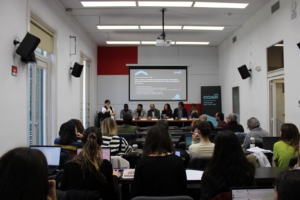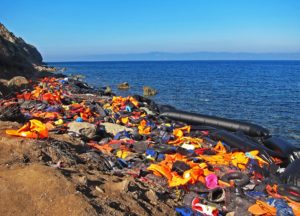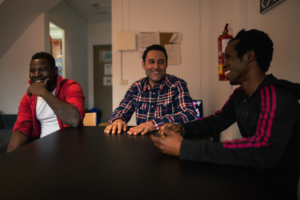La CCAR participa a la formació de formadors del projecte Integra-Train
12/12/2017

El seminari va reunir professionals de l’àrea d’acollida i assistència de refugiats de Bulgària, Grècia, Itàlia, Malta i Espanya que van debatre sobre possibilitats de transferència, adaptació o creació d’enfocaments i eines per proporcionar orientació i suport informatiu als beneficiaris de la protecció internacional. La formació va ser proporcionada per professionals d’Itàlia i Espanya treballant en organitzacions de suport a refugiats amb la tasca d’implementar programes d’acollida i d’integració governamentals en els dos països.
Karina Zubiaga i Susanna Nicolas de la CCAR van realitzar dues de les sessions formatives. La primera va proporcionar informació pràctica sobre el programa espanyol de tres fases per a la recepció i la integració dels refugiats que implica eines de suport de fins a 18 mesos per beneficiari. La segona sessió va presentar eines concretes d’acció conceptualitzades entorn del treball col·lectiu per donar suport als refugiats en el procés d’adquisició de llengües, orientació laboral i ajust general i adaptació a la societat espanyola.

En la discussió final que va seguir a les diferents sessions, els participants van acordar que els mòduls haurien de dirigir-se als treballadors socials per recolzar el seu treball amb els beneficiaris de la protecció internacional i, per tant, recolzar la millora dels sistemes d’assistència i integració en els tres estats membres. Alguns dels temes principals a incloure en els mòduls que ha destacat el presentador van ser: orientació cultural, educació cívica, orientació laboral, drets de les dones, salut i paper de la dona a les societats europees, accés a la justícia i serveis bàsics, incloses competències interculturals.

CCAR takes part in the training for trainers of the Integra-Train project
The provision of relevant information and orientation becomes key component in the process of reception and integration of beneficiaries of international protection. This was the topic put at the centre of the training seminar “Facilitating the Integration of Beneficiaries of International Protection by Provision of Orientation and Information”, hosted by the Centre for the Study of Democracy in Sofia between 29 November and 1 December 2017 and at which two representatives of CCAR attended.
The seminar gathered professionals in the refugee reception and support field from Bulgaria, Greece, Italy, Malta and Spain who discussed possibilities to transfer, adapt or invent approaches and tools in the provision of orientation and information support to beneficiaries of international protection. The training was provided by professionals from Italy and Spain working at refugee support organisations with a mandate to implement government run reception and integration programs in the two countries.
Karina Zubiaga and Susanna Nicolas from the Catalan Commission for Refugees (CCAR) conducted two of the training sessions. The first one provided practical information on the three-stage Spanish program for reception and integration of refugees which involves tools for support of up to 18 months per beneficiary. The second session presented concrete action tools conceptualized around group work to support refugees in the process of language acquisition, job orientation and overall adjustment and adaptation to the Spanish society.
In the final discussion that followed the different sessions, participants agreed that the modules should be directed at social workers to suport their work with beneficiaries of international protection and thus support the enhancement of the assistance and integration systems in the three member states. Some of the main topics to be included in the modules stressed by the presenter included: cultural orientation, civic education, job orientation, women’s rights, health and the role of women in European societies, access to justice and basic services including inter-cultural competences.



